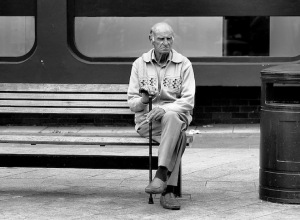“In industrial design, a policy of planning or designing a product with a limited useful life, so it will become obsolete, that is, unfashionable or no longer functional after a certain period of time.“
I first heard the term “planned obsolescence” in my high school psychology class and in my innocence was shocked and disgusted at the idea. Nearly four decades later, the concept doesn’t surprise me, but these days, I’ve been thinking off and on about a different kind of obsolescence.
It’s not just middle age that’s responsible, although the older I get and the more icons from my childhood and teenage years pass away, the more technology advances too fast for me to feel like I can keep up, the more I understand what made my elders look back fondly at “the good old days” and the more I understand the fabled “generation gap.” I don’t have a smart phone because I don’t need one. I’ve  never used some of the tools my author acquaintances rave about because until fairly recently, I did very little writing for years. Software applications I taught myself over a decade ago are periodically updated, but it hardly matters when I haven’t even used them in as long…and how long will it be before the next update (not to mention the next new gadget) appears? If only I had grandkids to instruct me.
never used some of the tools my author acquaintances rave about because until fairly recently, I did very little writing for years. Software applications I taught myself over a decade ago are periodically updated, but it hardly matters when I haven’t even used them in as long…and how long will it be before the next update (not to mention the next new gadget) appears? If only I had grandkids to instruct me.
“Sometimes I think it’s better for people like me to die and get out of the way,” my mother said a couple of years ago as she was ruminating on the same general subject. I disagreed, but in a way I understood. And now that I’m facing unemployment yet again, even as I know I’m ready for a change, I also know that comments like one from Maria Shriver in the December 2013 issue of AARP magazine will occasionally echo in my mind. Asked by an interviewer if it was “hard to get back into that [television journalism] work,” she admitted, “When you leave your career, it’s hard to find your way back. People move on. Things change. The technology’s different.”
Frankly, before I found the job where I’ve spent nearly six and a half years, by the time I’d submitted over 500 resumes I felt rather as if, like Hester Prynne, I should be wearing a letter on my clothing, only mine would be a “U” for “Unwanted” or “Unemployable”!
Can I get a witness?
But speaking of people moving on…
* * * * *
“Am I too boring to be a friend?” I asked myself sometime in the middle of last year, in one of those moments where nothing in particular is going on and your mind has time to wander and you remember that it’s been, oh, how many years now since you heard from so and so, and how come they never call or email or even try to friend you on Facebook? You know the ones I mean – the friends who just quietly drop out of your life with no warning. It happens to all of us at some point. And every once in a while we surface from our busyness long enough to wonder about them. Especially if they were once close enough to email us almost every day.
Now I’ll admit that I’m as much to blame as the next person when it comes to being lazy about keeping in touch. Friendships are a two-way street. It’s also normal, according to the experts quoted in newspaper and magazine articles on the subject, for some of them to just die a natural death as personalities, needs and circumstances change. But fast on the heels of that aforementioned moment came the memory of one friend telling me years ago, “You always have something new to tell me.” I was more active then, so I had something to talk about. Nowadays I can’t say that nearly as much…and then find myself wondering if people have disappeared from my life simply because I’ve gotten boring.
There’s a scene in Conrad Richter’s wonderful novel, The Trees, in which protagonist Sayward Luckett invites a woman newly arrived to the wilderness in which her family has settled to a thing called “tea,” a ceremony something Sayward has little familiarity with, but upon which she improvises with the resourcefulness that characterizes her even as a young teen. Yet the two women leave pauses in their quiet talk over the shared meal, says Richter, for it wouldn’t do to tell everything about themselves on the first meeting – what would they have to talk about the next time?
I was thinking along these lines when I met a fellow writer from an online group last year at Starbucks in person for the first time, after we’d discovered that, out of hundreds of members, we lived in adjacent towns. Specifically, I was thinking about it when we had our own quiet spots during conversation and I was scrambling around in my head for something else to say.
Perhaps I’m just being paranoid. Hell, maybe I just need to check out some tutorials and join a Meetup group or two. Or volunteer.
But then there are those who take on a form of obsolescence at least partly by their own choice…
* * * * *
“Tragic tale emerges a year after remains of mom, daughter found,” blared the headline in my local newspaper. Two women aged 62 and 87, the latter suffering from dementia, unseen by anyone for at least six months. Withdrawn from relatives, with no friends – thought by neighbors to be in Maryland, where they went for several months each year. Relatives sent flowers and registered letters, hoping for some kind of response when the silence became a real concern, but the women “guarded their privacy”…until their skeletal remains were found in their house by the police a year ago. Both are believed to have died of heart disease. The fate of their dog is unknown, since only his pet carrier was found, with a note saying that his owner was no longer able to care for him due to poor health.
From what has been pieced together of this incredibly sad story, it’s clear that the daughter was overwhelmed by caregiving and her own medical issues. And at some point, privacy turned into self-imprisonment.
It’s impossible to help wondering what was in the mind of that caregiving daughter found in the master bedroom. Had she simply given up? What tangled thoughts or fears were in the mind of her mother, found unclothed and dead in a hallway? Was she searching for help, alone, hungry, confused?
 Their story is, said the article’s author, “one of isolation – the kind that can accompany advancing age, especially in Florida where so many older people relocate and leave behind close relationships.” It’s a type of isolation I witnessed too frequently in the nursing homes my grandmother temporarily inhabited before spending her final decade with my mother…the “obsolescence” of the aged, who once held babies and jobs, who lived and loved and related, who were now dependent for the most intimate of care on paid staff.
Their story is, said the article’s author, “one of isolation – the kind that can accompany advancing age, especially in Florida where so many older people relocate and leave behind close relationships.” It’s a type of isolation I witnessed too frequently in the nursing homes my grandmother temporarily inhabited before spending her final decade with my mother…the “obsolescence” of the aged, who once held babies and jobs, who lived and loved and related, who were now dependent for the most intimate of care on paid staff.
In the back of my mind, I fear becoming one of them.
* * * * *
Devices made to wear out by a certain date so they’ll have to be replaced. Jobs disposed of at the scratch of a pen. Relationships fading into silence for reasons unknown…if we never bother to ask why.
How does one keep from becoming obsolete?
“Keep learning new things.” “Challenge your brain with puzzles.” “Get out and volunteer.”
Yet it’s so easy to isolate ourselves behind a computer screen, a Facebook group, a text or a tweet…because we don’t feel isolated, do we? After all, we’re communicating!
Until one day we’re not.
Next month another job will end. And while I’m ready for a change, ready to embark on a new chapter of my life, I’m also more aware than ever of the ticking clock. Remembering how comfortable I got sitting at home among my familiar surroundings and habits following other career breaks, even before I had the world at my fingertips on a home computer. I know I’ll have to step up my game to keep the virtual world from replacing the real one, because we need human contact to take us out of ourselves, to sharpen us, to remind us that the world is still a very big place even as our “connectedness” makes it feel so very small.
To keep from becoming “obsolete.”
* * * * *
How about you? Have you ever felt left behind by the rapid pace of technology or a job loss? Seen a formerly close relationship fade inexplicably into the sunset? Worried about “outliving your usefulness,” as a friend once described her state after physical disability forced her to leave the workforce for good? If so, how did you deal with it? I’d love to hear from you.

